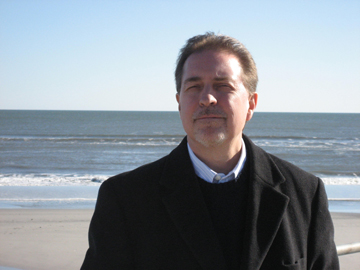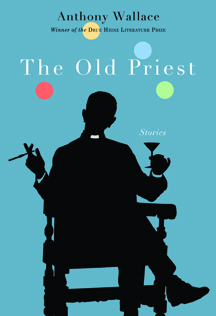By Benjamin Gleisser
 The stories in The Old Priest “connect the themes of time, history, and memory,” says author Tony Wallace ’78. The collection won the 2013 Drue Heinz Literature Prize and was recently named one of two finalists for the 2014 Hemingway Foundation/PEN Award for a distinguished first book of fiction.
The stories in The Old Priest “connect the themes of time, history, and memory,” says author Tony Wallace ’78. The collection won the 2013 Drue Heinz Literature Prize and was recently named one of two finalists for the 2014 Hemingway Foundation/PEN Award for a distinguished first book of fiction.
The story from which the book draws its name is about a Jesuit priest who is a high school teacher. It spans the life of the narrator and the old priest, and how their relationship develops through the years and mirrors the narrator’s relationship and struggle with the Roman Catholic Church.
Wallace, who spent five years writing the story, says the work is important to him because he finally came to terms with his Roman Catholic upbringing.
“That theme hadn’t come up in my writing,” says Wallace, senior lecturer in Boston University’s Arts and Sciences Writing Program. “I realized that by not writing about it, I was missing a huge piece of who I am.”

“He smokes, drinks, laughs, tells stories—makes people feel as though they are participating in the history of their own time. The old priest is a monologist of the old school, tossing brightly colored balls into the air and keeping them aloft.”
–From “The Old Priest”
Transformative power
Wallace is ambivalent about his relationship with the Catholic Church, and equally ambivalent about his relationship with language and the kind of transformative power readers associate with it.
“I don’t know if I proceed according to that assumption,” he says. “Maybe I do in the sense that Kafka means when he says that a book should be an axe to chop up the frozen sea of the heart. And I mean that beginning with my own heart: I think that’s what’s in it for the writer, if the work is any good.”
Wallace says English professor Fred Closs ’51 ignited his passion for writing.
“I didn’t do anything serious toward becoming a writer until I was in my late 30s,” says Wallace, who earned an MA in creative writing at Boston University. “Professor Closs encouraged me to write, and I suppose he’s the teacher whose influence has stayed with me…When I decided to quit my casino job and pursue a career as a writer, it was in the back of my mind that he’d told me that was something I could do if I wanted to.”
Thrilling praise
“The Old Priest” won a Pushcart Prize and was included in Pushcart Prize XXXVII (2013). The collection The Old Priest won the 2013 Drue Heinz Literature Prize, the most prestigious prize in America for an unpublished collection of short stories. The collection has been published by Pittsburgh University Press.
“At the PEN/Hemingway event, Scott Turow, who was the senior judge, told me that “The Old Priest” is the best piece of fiction he’s read in a long time. That thrilled me—you know, praise like that from a guy who has sold 25 million books!”
Wallace’s poetry and short fiction have been published in literary journals including CutBank, The Atlanta Review, Another Chicago Magazine, The Florida Review, and River Styx. He has twice been a finalist for the Flannery O’Connor Short Fiction Award.
Fred Closs ’51
Closs, who taught English from 1964-85, brought many writers to campus and started what’s now called the Roethke Humanities Festival, named for the poet who taught at Lafayette in the 1930s. Closs and his wife, Joan, established the Ruth Mary Callahan Closs Residency in 1984.

